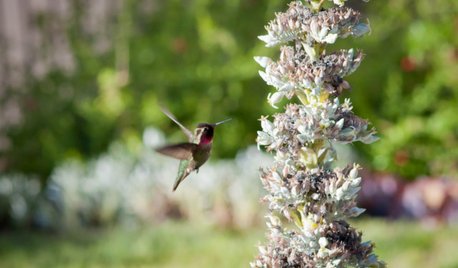Review of IPM
hoodat
13 years ago
Related Stories

GARDENING GUIDESHow to Create a Wildlife-Friendly Garden
Learn what you need to know about planning a landscape that supports birds, bees, butterflies and more
Full StoryMore and more of this forum seems to be devoted to using sprays etc to overcome pests. It's time to look at what this forum was originally intended to be. The point is to view your garden as an integrated whole, balanced to the point where predators keep the pest population under control. As soon as you begin spraying poisons, organic or not, you destroy that balance, calling for more and more spraying to try to get it under control. This is the trap chemical gardeners fall into.
Using the IPM method your chard and lettuce will probably have a few bites taken out of it and you will lose some cukes and tomatos to pickle worms etc. The point is - is the damage light enough to give you a steady supply of food? If it is, put away that sprayer and let the bugs have a few bites. We are the caretakers of the Earth, not the masters of it.


Kimmsr
bugsbugme
Related Professionals
Forest Acres Landscape Architects & Landscape Designers · Manhattan Beach Landscape Architects & Landscape Designers · Oatfield Landscape Architects & Landscape Designers · Saint Charles Landscape Architects & Landscape Designers · Willowick Landscape Architects & Landscape Designers · East Haven Landscape Contractors · Harrisburg Landscape Contractors · Hayden Landscape Contractors · Lehigh Acres Landscape Contractors · Mastic Beach Landscape Contractors · Miller Place Landscape Contractors · Palatine Landscape Contractors · Pleasant Hill Landscape Contractors · Wethersfield Landscape Contractors · Clinton Swimming Pool Buildersrhizo_1 (North AL) zone 7
Kimmsr
rhizo_1 (North AL) zone 7
Kimmsr
hoodatOriginal Author